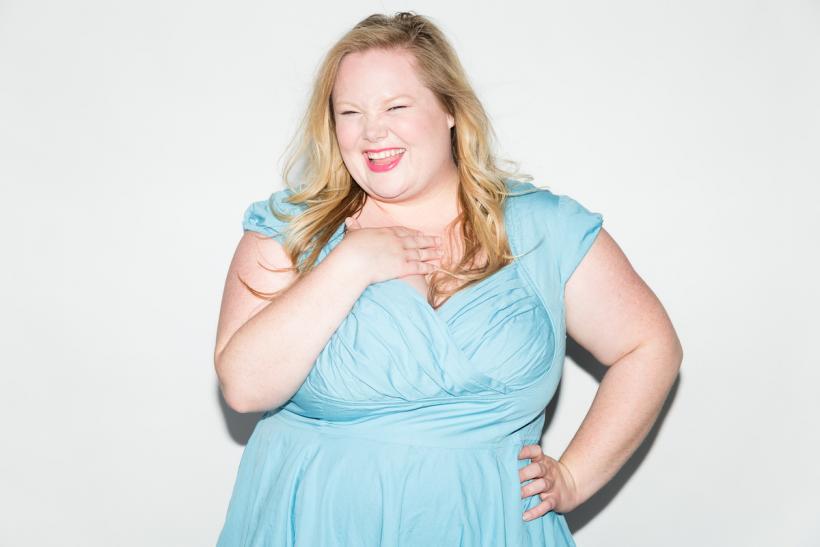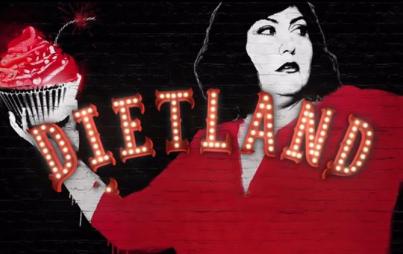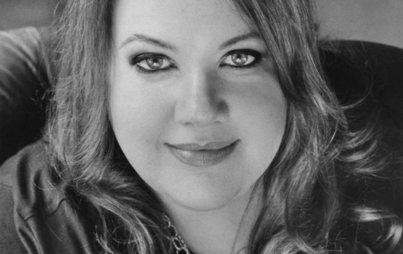
Photo: courtesy of Jen Ponton
My name is Jen Ponton, and you might know me from AMC’s Dietland. While this project was one of my favorites, it joins several body-positive characters I’ve had the distinct joy of playing — a lascivious duchess on Hulu’s Deadbeat, the dreamy ingenue Franny in the film Love on the Run, and now, Addy — the heroine of my new series, Queens of Daytime.
We’ve seen the fat leads who hate themselves; we’ve seen the fat leads who learn to love themselves in spite of their body; we’ve seen the fat leads who learn to love themselves because of their body.
With Addy, I wanted to say something new — she just loves herself. Her body is refreshingly plotless.
As a fat actress, I spent my high school and college theatre years playing elderly, matronly crones and clowns. I was wholly resigned to the reality that I would never be Juliet, or Sally Bowles, or Belle. There was no disappointment, just a nagging worry — what happens when I graduate? I certainly couldn’t be playing 50- and 60-year-olds. Thankfully, the television industry was just beginning to boom in New York. There, I discovered far more openness and willingness to cast fatter bodies than I had ever experienced in theatre (sadly, this is still the case). I booked a career-changing role on 30 Rock, and I’ve been in love with television ever since.
That was in 2010. Almost ten years later, television is proving to be the most intrepid medium in entertainment. Slowly but surely, more stories of women, LGBTQ+ folks, and people of color are being centered in television. To my delight, fat bodies are being included on that list. The unceremonious cancellation of Dietland fueled an already-vicious uproar over the renewal of Netflix’s Insatiable. When Hulu’s Shrill was released in March, the acclaim was immediate — a fanbase that had been discounted and overlooked was finally given a multi-season fat heroine.
You Might Also Like: 'This American Life' Is Really Bad At Talking About Fat
I’ve been asked many times whether or not I think Dietland will get a second chance, and it always hurts when I have to say no. As we’re learning in this tumultuous time, the small victories we see now were failures twenty, thirty, fifty years ago. It took years of seeing fat characters who hated themselves to get to see Plum Kettle’s fiery liberation; it took Plum’s liberation to get to see a beaming Annie Easton in a sea of joyous, fat, bikini-clad bodies.
I’ve long posited that the next frontier is just as refreshing: fat protagonists whose bodies are of no concern.
I’ve been experimenting on this frontier for many years. I made the puppet-y web sitcom, The Weirdos Next Door, where I played the love interest to a shy, nerdy, red monster. I spent years writing films that cast me as a charming, earnest, ingenue. When I started writing television pilots, the training wheels came off — I was ready to write Addy.
A period piece set in the 1950s and ‘60s, Queens of Daytime introduces Addy as a charming, driven, can-do gal from Georgia who moved to New York City to work in soap operas. When she’s hired as the new producer of the soap Tomorrow is Forever, she captains her ship with a confident, feminine power. She softens, she charms, she builds people up; she’s always dressed in pearls and crinolines and dainty driving gloves.
She also navigates life in a fat body.
Addy’s size does not diminish her femininity, her appealing nature, or her success. Her size does not reduce her desire to be seen or to embody the style of the time. Her size is not the subject of watercooler gossip. It is simply how she navigates the world. She’s come to her industry to do great things, and by golly, she will do them.
Addy is not a figment of the imagination, either. In the '50s and '60s, soaps were owned not by networks, but by detergent corporations. These corporations mainly saw soap operas as one hour-long commercial; they told a frothy story, and they sold the dish soap and the mop fluid. Business got so good for these corporations that they thought — why don’t we cut costs? Women would be cheaper, let’s hire a few of them and fire the men.

That decision would go on to create a “hole in the fence” of television; women were hired and promoted as writers and producers in soaps decades before they would be employed in primetime television. Under the lax scrutiny of these corporate bosses, the women in charge were able to tell far more socially progressive stories than any corporation would have wanted. Soaps became the first medium to broach anything taboo, including divorce, reproductive rights, women’s health, gay rights, the AIDS crisis, and civil rights. While the men in charge didn’t care enough to pay attention, the soaps had an enviable demographic — millions of rapt women watching at home.

I co-wrote Queens of Daytime with Emmy-winning soap star, Louise Shaffer. Louise brought with her a rich history of the soaps, and a career spanning over 50 years. We were enthralled with the opportunity to create a period show that could genuinely be a feel-good experience — for women, for queer folks, for fat folks, for Black folks. This progressive pocket in history afforded us the ability to create a realistic oasis of empowerment without veering off into fantasy.
While Addy and her crew are still a work of fiction, I hope that the effect that she has on viewers is very much real. I believe that there is power in normalizing what we see every day.
The more exposure we have to diverse bodies in entertainment, the more we’ll be able to look in the mirror and see that same potential in ourselves.
Queens of Daytime from Jen Ponton on Vimeo.







